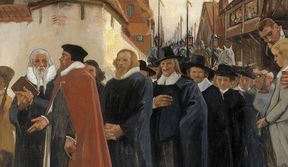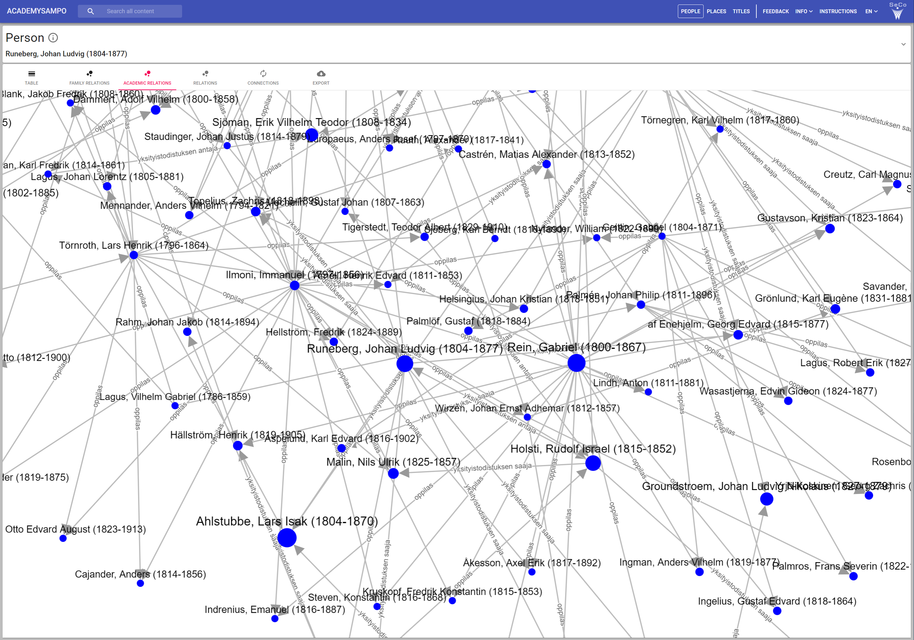How did Runeberg's career progress? AcademySampo helps find the answer from a huge amount of data

On Runeberg Day, Friday 5 February, a new AcademySampo portal will be published, which will gather a huge amount of information about people who enrolled to study at the university in Finland, in 1640-1899. The service has been developed by researchers from Aalto University and the University of Helsinki's Center for Digital Humanities HELDIG.
The most important material of the AcademySampo are the student registers (‘ylioppilasmatrikkelit’ in Finnish) of the Royal Academy of Turku and the University of Helsinki, which contain information about all persons enrolled at the university during that period. At the time, the Academy of Turku - which became the University of Helsinki in 1919 - was the only university in Finland. The researchers have supplemented the database with information on the later stages of students' lives, such as relationships, careers, and professions.
The AcademySampo includes a "home page" for all the 28,000 people listed in the student registers. In addition, up to about 50,000 other people have been recognized from the texts.
The home page gathers together biographical information about a certain person, and all the crumbs of information related to them have been linked together. The data has also been linked to external databases, such as the BiographySampo and the collections of the Finnish Literature Society, as well as WikiData.
The AcademySampo provides comprehensive information on several important figures in Finnish history, such as the national poet Johan Ludvig Runeberg, the composer Jean Sibelius, President Carl Gustaf Emil Mannerheim, Professor Henrik Gabriel Porthan who has been called the father of Finnish history, and Tekla Hultin who was the first Finnish woman to receive a Ph.D. degree and who had a successful career as a journalist, editor-in-chief, and political influencer. In total, the AcademySampo lists 521 women who enrolled to study at the university, including Maria Tschetschulin - the first female high school graduate in the Nordics - and Emma Irene Åström - Finland's first female university graduate.
Technologies of the semantic web are the technical innovation behind the AcademySampo. The semantic web is a data network created within the internet to answer the needs of computers. In it, the information is linked to each other. The idea is that the computer understands the semantic web – while the human user, in turn, understands and uses the web pages created by the machine using the semantic web. The same technology was also behind the previously published Sampo portals, such as WarSampo and BiographySampo.
According to Eero Hyvönen, Professor at Aalto University and Director of HELDIG ‘Technically, what is new in the Academy Sampo, are the use of learning artificial intelligence in investigating relationships between different people, and new types of network analyzes, among other things.’
The service includes intelligent search and browsing functions, which are combined with data analytical tools and data visualizations in the form of networks, statistics, graphs, and maps. Thus, users can easily utilize and visualize data without having to learn to program complex data analytics tools.
The image below visualizes J. L. Runeberg’s academic network, which can be created with a few clicks.

A collaborative effort between humanists and computer scientists
The AcademySampo is based on years of effort by humanists and computer scientists. The digitization, transliteration, and completion of handwritten student registers was largely a handicraft contract of about ten person years, drawn by Yrjö Kotivuori from the National Archives of Finland and Veli-Matti Autio from the archives of the University of Helsinki’s Archives and Registry.
After that, computer scientists created a semantic network, published the network as an open linked data service for everyone to use, and implemented the intelligent online service Akatemiasampo.fi using the service's interfaces.
The AcademySampo can be used by both researchers and citizens interested in history. The launch event, which will be open for everyone interested in the topic, will showcase how AcademySampo helps historians and genealogists, among other people.
AcademySampo has been implemented at Aalto University in co-operation with the University of Helsinki's Center for Digital Humanities HELDIG and the archives of the University of Helsinki’s Archives and Registry. It is part of the digital anthropology linked open data infrastructure in Finland (LODI4DH), which is part of the Academy of Finland's roadmap.
The launch event will be organized over Zoom on Friday, February 5, 2021 in Finnish. Find the program of the event and a link to register here.
Further information
Eero Hyvönen
Professor, Aalto University
Director, University of Helsinki Center for Digital Humanities HELDIG
Tel. +358 50 384 1618
eero.hyvonen@aalto.fi
- The AcademySampo will be available from February 5 at https://akatemiasampo.fi
- The home page of the AcademySampo project https://seco.cs.aalto.fi/projects/yo-matrikkeli
- An English introduction video: https://player.vimeo.com/video/462993654
- More information about the Sampo series https://seco.cs.aalto.fi/applications/sampo/
Read more news

‘Mesoscale’ swimmers could pave way for drug delivery robots inside the body
Researchers have discovered how tiny organisms break the laws of physics to swim faster — such secrets of mesoscale physics and fluid dynamics can offer entirely new pathways for engineering and medicine.
Design strengthens industrial competitiveness – human-centered factory work at the core
Factory work is undergoing a transformation: new technologies and artificial intelligence are changing the content and roles of work. Aalto University’s Department of Design is studying this change from a human-centered perspective in the HiFive project.
The proxy server for remote access to e-resources is changing
If you have problems using e-resources, try accessing the e-resource using VPN connection.






